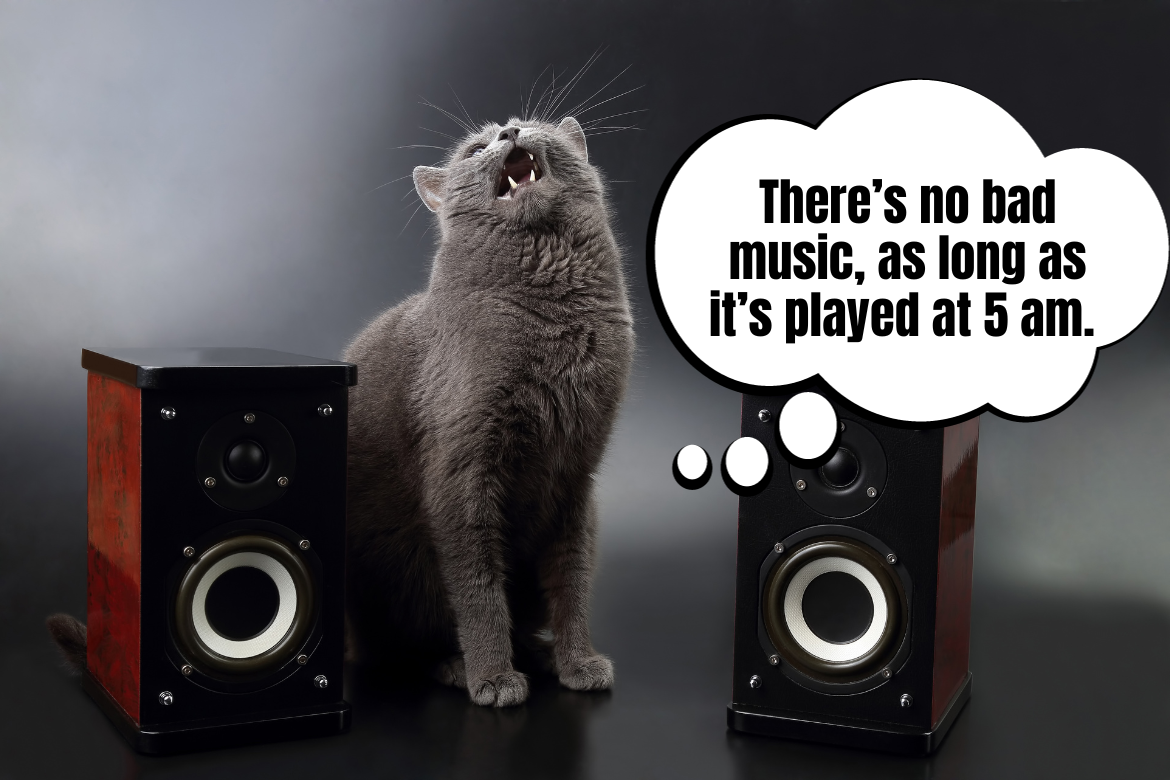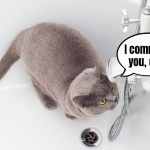Cat hearing is an incredible sense that won’t miss even the subtle sound of a buzzing fly under the ceiling, the opening of a tuna can in the kitchen, or the dripping of water from the faucet. Cats can even anticipate the return of their Hooman by waiting on the doormat because they recognize the sound of footsteps on the staircase from a distance. But among all the sounds of everyday life, there are certain sounds in the world that drive cats absolutely wild. Find out, fabCat, what sounds are meant and how you can use this knowledge to communicate even better with your furry friends.
What’s going on there, kitty – facts about cat hearing
A cat’s ear can hear sounds with a frequency of up to 64,000 Hz (according to some sources, even higher), while a human ear can detect sounds up to a maximum of 20,000 Hz. This significant difference primarily results from the adaptation of each part of a cat’s body to effective hunting. No wonder our furs can hear a buzzing mosquito under the ceiling before we notice it! Adding the ability to move the external part of the ear, cats can pick up sounds that our ears simply ignore. Is your cat sitting still and staring at the wall? There’s a good chance it hears something inside (e.g., water flowing in pipes). This precision in hearing applies to both wild cats and couch potatoes, even if our domestic kitties don’t need to listen carefully to every passing prey.
The reason why cats pay special attention to certain sounds heard at home or produced by humans is simple. Based on their past experiences and information inherited from wild ancestors, cats associate some noises with:
- The promise of pleasure (e.g., the sound of opening a treat package),
- Situations worth investigating (e.g., the sound of a bird landing on the windowsill or water dripping from the faucet),
- Play/hunting (e.g., the rustle of feathers, a string moving on cardboard, squeaks from a toy, a rolling ball),
- Potential threat (usually loud and unexpected noises, e.g., the vacuum cleaner, doorbell).
Why do cats like silence?
Very sensitive hearing has its downsides—cats don’t like noise, and they definitely fare better in a quiet environment. This especially applies to more timid, withdrawn cats who may perceive any unexpected sound as a potential threat. Therefore, when living with cats, it’s worth considering their needs and, as much as possible, minimizing noise. This doesn’t mean we should tiptoe around our furs – absolutely not 🙂 In fact, it’s worth getting cats used to certain sounds (e.g., playing music, running the washing machine, vacuuming, louder conversations) so they don’t have to go through life in constant fear. However, be aware that cats simply hear more, and what may not bother us or make noise for us can be deafening for them.
DID YOU KNOW…? Cats appreciate some genres of music, and you can even find playlists created specifically for them on the internet? Cats particularly enjoy music with a frequency and tempo similar to purring, so they gladly relax to classical or jazz music. It works well for us too, as we can be productive with such sounds.
Sounds that will drive your cat crazy (with joy)
Gentle sounds and calm music favor cat naps and full relaxation, but which sounds will immediately awaken your cat’s inner hunter and make them ready for play or hunting? The most recognizable (internationally) sound that will grab a cat’s attention is the classic “pss pss.” Properly executed, it brings to the cat’s mind the sounds of a small mouse sneaking among the leaves, a grass hopper sitting in the grass, or a bird that landed on a nearby bush. It’s clear that the cat’s engine will start with such a signal! As Guardians, we can use such sounds to attract a cat’s attention, invite our furs to play, or simply call them. However, make sure that the sounds you make towards the cat are always associated with something specific. If you use “pss pss” to call the cat to play, guarantee them good entertainment. If you open vegetable cans for a salad, and the cat thinks it’s tuna for them – toss a treat to the kitty as compensation. Otherwise, the furball will simply start ignoring the sounds directed at them.
Let’s also go back for a moment to the mentioned high-frequency sounds audible to the cat. They also attract the cat’s attention, and that’s why cats are more responsive to calls and names containing higher frequencies in the middle or at the end of the word. Let’s take one of our team cats at myKotty as an example – if we call Teddy as “Teodor,” there’s a good chance he’ll ignore our calling, even if he recognizes his name. In the monotonously pronounced name, there’s nothing that can potentially interest him. However, if we shorten it to “Teddy,” emphasizing the “i” at the end, we’ll definitely get his attention. High, soft “i” can change a lot. Will Teddy respond to that calling? That’s a different story – after all, cats themselves decide what they want to react to. However, piquing the cat’s interest is already the first step to success.
How do you know if a cat likes a certain sound?
Getting a cat’s reaction to specific sounds doesn’t necessarily mean that the cat liked the sound. To know whether your cat reacts positively or not, you must understand their body language, fabCat! If the cat is relaxed, closes its eyes, stretches calmly, has no problem with playing, cuddling, or napping, the sounds in the environment probably don’t bother them. When a cat is particularly interested in a sound, you can recognize their curiosity by ears pointed forward (listening to the source of the sound), dilated (or alternately dilating and narrowing) pupils, a raised and curled tail like a question mark. Your cat is telling you that you have caught their attention. Among the most interesting sounds for a cat, you will find variations of chirping, rustling, quiet squeaking, light scratching, dripping, and buzzing.
In addition to sounds they like, cats also have a whole catalog of sounds they dislike. And it’s not just about noise. Cats don’t like, among other things, the sound of hissing (that’s why they don’t like it when you spray countertops with a cleaning agent or use deodorant). From their perspective, it sounds like hissing, which cats use, among other things, to scare off enemies. On the same principle, they won’t like loud sounds of meowing, a crying baby, a buzzing vacuum cleaner, or even loud, irritating, repetitive sounds. When a cat doesn’t like a sound (or noise), they may run away, hide, or take on a defensive-aggressive stance and hiss towards the source of unpleasant noises. If they’re afraid, they may lay their ears back, try to curl up, tuck their tail under, or freeze in place.
What sounds do your cats react to? And do you ever use them during play, fabCats? Let us know in the comments – let’s talk 🙂




